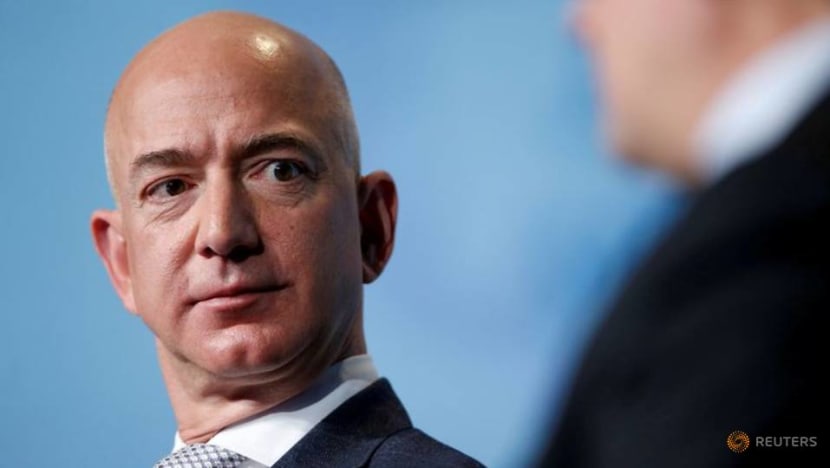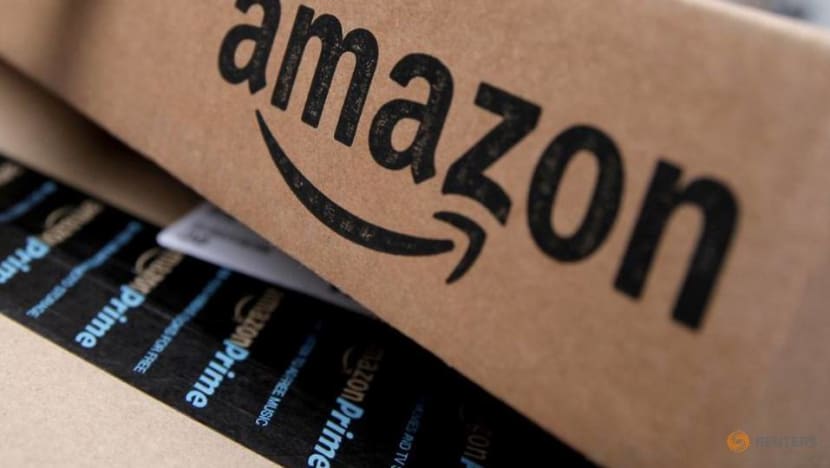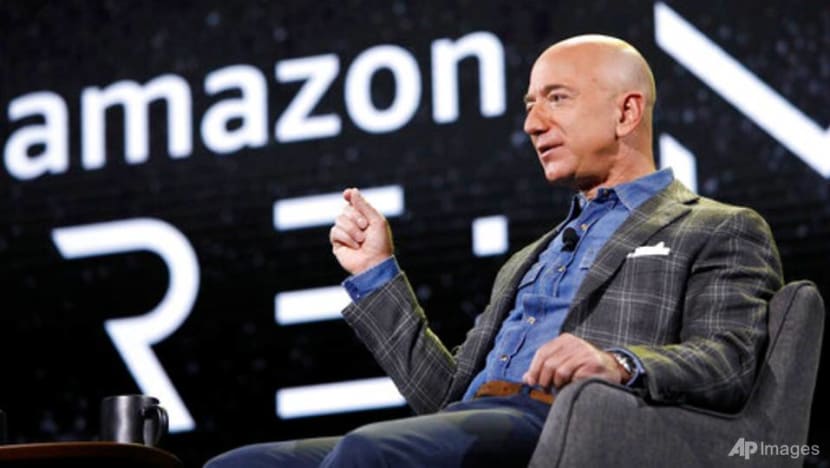commentary Commentary
Commentary: Jeff Bezos changed the world through Amazon. He will be a hard act to follow
Bezos – who will remain at the company as executive chairman – set his sights on making it an “everything store”, says an observer.

Jeff Bezos, founder and CEO of Amazon, speaks during an address to attendees at Access Intelligence's SATELLITE 2017 conference in Washington, US, Mar 7, 2017. (Photo: Reuters/Joshua Roberts)
COLLEGE STATION, Texas: Amazon announced Jeff Bezos is stepping down as CEO almost 27 years after he founded the company to sell books to customers over dial-up modems.
Amazon wasn’t the first bookstore to sell online, but it wanted to be “Earth’s biggest". When it first launched, a bell would ring in the company’s Seattle headquarters every time an order was placed. Within weeks, the bell was ringing so frequently employees had to turn it off.
But Bezos – who will remain at the company – set his sights on making it an “everything store". After achieving dominance in retail, the company would go on to become a sprawling and powerful global conglomerate in numerous lines of business.
READ: Commentary: How Tencent, that other Chinese Big Tech giant, is beating a path to a trillion dollars
Today, Amazon is the third-most valuable US company – behind Apple and Microsoft – with a market capitalisation of around US$1.7 trillion, greater than the gross domestic product of all but a dozen or so countries.
REDEFINING RETAIL
Amazon – named after the world’s largest river – continually took shopping convenience to newer levels.
Before Amazon’s founding on Jul 5, 1994, shoppers had to travel to stores to discover and buy things.
Shopping used to be hard work – wandering down multiple aisles in search of a desired item, dealing with crying and nagging kids, and waiting in long checkout lines.
Today, stores try to reach out to shoppers anywhere, anytime and through multiple channels and devices.
After first experiencing two-day free shipping from Amazon’s Prime membership program, shoppers started expecting no less from every online retailer. An estimated 142 million shoppers in the US have Amazon Prime.
READ: Commentary: Has corporate influence gone too far in America?
READ: Commentary: Is Tesla’s share price justified? Probably not
The company made shopping more convenient through features like one-click ordering; personalized recommendations; package pickup at Amazon hubs and lockers; ordering products with the single touch of a Dash button; and in-home delivery with Amazon Key.
Shoppers can also search for and order items through a simple voice command to an Echo or by clicking an Instagram or Pinterest image. Amazon even has a cashier-less “Go” store in Seattle.

Amazon has also been a factor in the rising closures of brick-and-mortar stores that can’t keep pace with the changes in retail.
Even before the pandemic, stores were closing at a phenomenal rate, with analysts predicting a coming “retail apocalypse.”
Amazon benefited enormously last year as much of the U.S. went into lockdown and more consumers preferred ordering goods online rather than risking their health by going to physical stores.
Amazon’s share price has almost doubled since the lockdown began in March 2020, even as over 11,000 retail stores closed their doors.
READ: Commentary: Google should not be allowed to run experiments on users without their knowledge
A MAJOR EMPLOYER
Amazon’s impact extends to other industries, including smart consumer devices like Alexa, cloud services like Amazon Web Services and technology products like drones.
Such is Amazon’s impact that industry players and observers use the term “Amazoned” to describe their business model and operations being disrupted by Amazon.
Today, Amazon is the second-largest US-based publicly listed employer and the fifth biggest in the world.
It employs 1.2 million people, having hired 427,000 during the pandemic. No wonder Amazon created such a buzz in 2018 when it held a competition to select a location for its second headquarters. It eventually picked Arlington, Virginia.
Amazon’s work culture is intense. It has a reputation as a cutthroat environment with a high employee burnout rate. It is automating as many jobs as possible, mostly in warehousing.

At the same time, after criticism from policymakers, Amazon stepped up in 2018 and raised the minimum wage for its US employees to US$15 per hour.
Faced with growing criticisms about the mounting impact of Amazon’s boxes and other packaging material on the environment, Amazon has also pledged to disclose more information about its environmental impact.
THE NEXT GENERATION
What’s in store for Amazon as Bezos steps down from his CEO role later this year?
Bezos, who will stay on as Amazon’s executive chairman, has previously said his focus is on preventing Amazon from dying. As he noted at a 2018 all-hands meeting, “Amazon is not too big to fail.”
As a professor of marketing who has conducted research on online retailing and analysed hundreds of cases, I believe that Amazon’s future – and humanity’s – is inextricably linked to the rise of artificial intelligence. Starting with Alexa, the company’s virtual assistant, Amazon is betting on AI.
In fact, Amazon is testing anticipatory shipping, a practice in which it anticipates what shoppers need and mails the items before shoppers order them. Shoppers can keep the items they like and return those they don’t want at no charge.
It is also betting on cashier-free stores and AI-powered home robots.
Amazon’s future success will depend on how the incoming CEO – current head of cloud computing Andy Jassy – navigates these new technologies while pushing the company into more industries, such as health care and financial services.
His challenge is to keep Bezos’ legacy and Amazon’s disruptive culture alive.
How much credit does F&B in Singapore deserve for getting through COVID-19 thus far? Listen to CEO foodpanda Jakob Angele and Managing Director of The Soup Spoon Andrew Chan give their take on CNA's Heart of the Matter podcast:
Venkatesh Shankar is Coleman Chair Professor of Marketing and Director of Research at the Center for Retailing Studies, Mays Business School, Texas A&M University. His areas of specialization include digital business, marketing strategy, innovation, retailing, international marketing, and pricing. This commentary first appeared in The Conversation.












